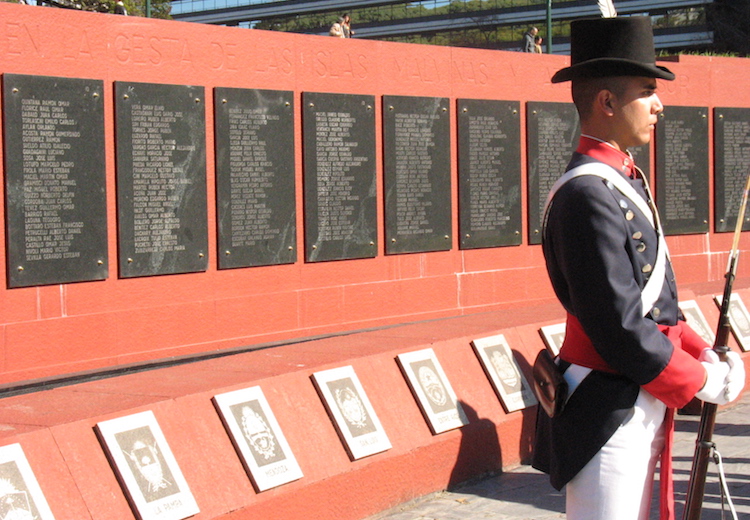By Kwame Buist
NEW YORK (IDN) – The UN Special Committee on Decolonisation has approved a draft resolution calling for a peaceful and negotiated settlement of the dispute between Argentina and the United Kingdom concerning sovereignty over the Falkland/Malvinas Islands as the only way to end the “special and particular” colonial situation of the islands.
The resolution calls for the governments of both countries to consolidate the current process of dialogue and cooperation by resuming negotiations in order to find a peaceful solution to the sovereignty dispute as soon as possible.
Argentina’s Minister for Foreign Affairs and Worship Jorge Faurie told the committee, which ended its work on June 21, that his country’s right of sovereignty over the Malvinas Islands, South Georgia Islands and South Sandwich Islands, and the surrounding maritime areas, was based on solid historical and legal grounds.
“The passage of time has not diminished the validity of our claims,” he stressed, while saying that Argentina was nevertheless convinced that frank dialogue with United Kingdom would allow a higher level of cooperation and the resumption of negotiations towards a peaceful settlement of the sovereignty dispute.
He said the dispute had originated in the disruption of Argentina’s territorial integrity in 1833, when the United Kingdom had occupied the islands, expelling both the Argentine population and the legitimate Argentine authorities. It had then populated the territory with its own settlers and impeded the settlement of Argentine citizens.
He noted that no United Nations resolution incorporated the principle of self-determination as a criterion in the territory’s decolonisation process and that application of that principle would require the existence of a people subjected to foreign domination.
However, he said, a people entitled to that right did not exist in the Malvinas, and granting the territory’s inhabitants the power to decide its status would contravene both the UN declaration on the granting of independence to colonial countries and peoples, and international law.
During the Special Committee’s hearing of petitioners, Ian Hansen of the Falkland Islands (Malvinas) Legislative Assembly said that Argentina’s claims were unfounded and unwelcome, citing the 2013 referendum in which 99.8 percent of the Territory’s inhabitants had voted to remain an Overseas Territory of the United Kingdom.
He said that the right of the islanders to self-determination was enshrined in the United Nations Charter and it was difficult to understand why any country would wish to remove that fundamental right.
While relations between the United Kingdom and the government of Argentina were arguably better than they had been for years, he said the situation of the Falkland Islands (Malvinas) in relation to Argentina’s claim of sovereignty remained the same.
“Why would we wish to change our way of life,” he asked. “We make our own laws and directly regulate all industry activities within our territory.”
Luis Gustavo Vernet, a great-great grandson of Luis Vernet, the first Argentine governor of the Malvinas Islands, said he was an Argentine citizen and living evidence of the Argentine people who had peacefully inhabited the islands and been expelled by force.
In1823, Argentina had allowed Luis Vernet to settle in the Malvinas, he said, recalling that until 1810, Spain had been in control of the islands. After the May Revolution, however, Argentina had inherited title over the territory and a settlement of 200 people had developed.
Argentina had accepted Luis Vernet’s proposal to establish a settlement, paid for by Buenos Aires, and the land had been granted on January 5, 1822. Luis Vernet had given the British representative, Woodbine Parish, a translation of the concessions, a document legalised by the British Vice-Consul.
Gustavo Vernet recalled the 1825 Treaty of Friendship and Trade with the United Kingdom, saying it was of crucial importance as it acknowledged Argentina’s legitimacy. The United Kingdom had not registered any reservations over the territory, which at the time was administered by Rio de la Plata.
However, with Luis Vernet’s appointment as governor, the United Kingdom had claimed the appointment was incompatible with its rights over the territory. Protests had ensued, and in 1833, the British warship ‘Clio’ had arrived in Puerto Soledad, raised the British flag, lowered that of Argentina and pressed inhabitants to leave.
“This was an illegal British administration,” he said, adding that, after having recognised Luis Vernet’s properties as his own, they had forced him to withdraw them in 1833 and sold the lands to the Falkland Islands Company.
“The inhabitants of the Malvinas want to determine their own future in their own country,” he said, urging the United Kingdom to find a solution to the sovereignty dispute, taking into account the interests of the islanders and the rights of all parties.
During the committee meeting, delegates from the region expressed resounding support for Argentina’s claims to the territory and the surrounding maritime area, calling for the resumption of negotiations to end the sovereignty dispute.
Several referred to the outcomes of regional meetings attesting to that need and, on behalf of the Community of Latin American and Caribbean States (CELAC), El Salvador’s representative recalled the 2014 Havana Declaration, in which heads of state had reiterated their commitment to consolidating the region as a zone of peace.
Elbio Frieri of Uruguay recalled appeals by the international community that no decisions be taken that would unilaterally change the status of the Malvinas. The question, he said, was a special and particular case of colonialism involving a dispute over sovereignty.
Conveying his country’s firm support for Argentina’s legitimate right to the Malvinas Islands, South Georgia Islands, South Sandwich Islands and surrounding maritime areas, he stated: “The Malvinas are Argentina’s.” [IDN-InDepthNews – 28 June 2018]
Photo: Argentine prisoners of war at Port Stanley after 74-day war between Argentina and Britain. Credit: Wikimedia Commons.
IDN is flagship agency of the International Press Syndicate.
facebook.com/IDN.GoingDeeper – twitter.com/InDepthNews

